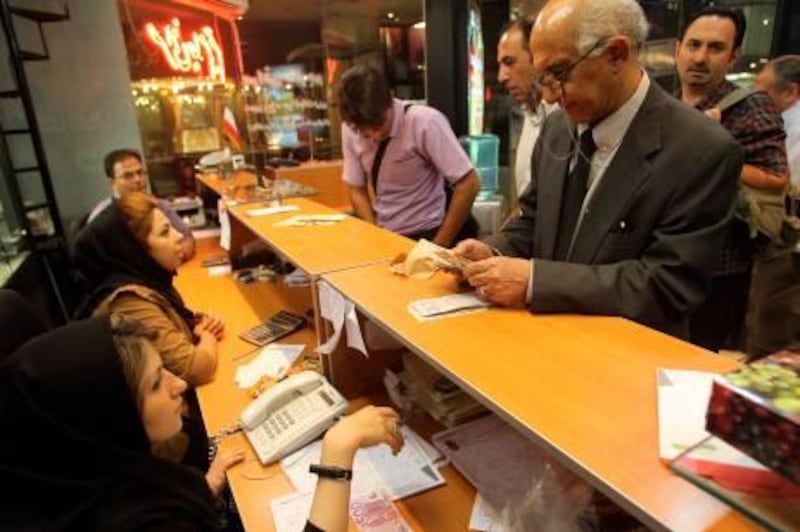TEHRAN // The threat by Tehran's top prosecutor this week to take legal action against what he called "economic saboteurs" is aimed by authorities at helping reverse a recent sharp downturn in the value of the national currency, analysts said.
Tehran prosecutor general Abbas Jafari Dowlatabadi said Wednesday that Iran's courts had the authority to act against those "who disturb public order by hoarding commodities, closing the bazaar or manipulating the supply of commodities in the market".
Mr Dowlatabi's warning, reported by Mehr News Agency, came against the backdrop of the rial's weakened value against the dollar, a drop that began last week. In a bid to bolster confidence in the currency, President Mahmoud Ahmadinejad said Wednesday the country's foreign currency reserves were at an unprecedented level and there was no cause for concern.
Still, money changers have reacted to the weakening rial by exchanging it in only small amounts or by stopping transactions altogether. Compounding the rial's woes are gold merchants in Tehran's Grand Bazaar and elsewhere in Iran, who have been on strike to protest the government's imposition two weeks ago of a value-added tax of 3 per cent.
In exchange for a government promise to hold talks about the VAT tax, the gold traders agreed this week to open their shops. But transactions were still on hold yesterday, witnesses said. A similar strike two years ago forced the government to defer plans for a VAT tax. The rial reached its lowest value against the dollar last Wednesday when it traded between 12,200 (Dh4.27) and 12,500 against the dollar, compared to 10,500 only a few days earlier.
An infusion of millions of dollars by the Central Bank since Saturday has calmed the market. Nevertheless, the move has failed to bring the rate down to 10,600 rials, which Central Bank officials now say is the "normal" and "targeted" rate. Yesterday, Tehran's exchange houses were offering 11,000 rials to the dollar, while the Central Bank was offering 10,700 rials to the dollar to individuals with identification documents wanting to buy US$1000 to $2,000 (Dh3,673-Dh7,346).
Analysts say the devaluation of the rial was triggered by a curb in money transfers between Iran and UAE banks, which began in August. "The halt disturbed the forex market and the failure of the Central Bank to immediately address the problem by injecting foreign currency into the market eventually resulted in further depreciation of [the] rial," an analyst in Tehran who declined to be quoted by name said.
In an effort to pressure Iran to halt its nuclear programme, the United States and the European Union have imposed direct sanctions on banks in their jurisdictions doing business with Iran. Banks in other countries have restricted their transactions with Iranian banks to avoid complications with their European and US customers. While Iranians traveling abroad now face less difficulty in buying foreign currency, the problem of transferring money to other countries continues to plague importers here.
Many have resorted to collecting the hard currency they need and carrying it in person to branches of international banks outside Iran. There the money can be transferred to their business partners in other countries.
"Most money orders intended for our partners in other countries were relayed through money exchangers here to UAE or Turkish banks and then to our partners. The new circumstances have made our business transactions a lot more complicated and much costlier," said a businessman who refused to be quoted by name. The rial slump comes amid concerns over a possible sharp rise in the inflation rate resulting from the implementation of the government's controversial plan to slash subsidies. Authorities are expected to implement the plan this month, but no definite date has yet been set.
The cuts would drastically increase energy prices - in the case of petrol, by as much as 400 per cent - and have a ripple effect throughout all sectors of the economy. To soften the impact of price increases, the government says it will soon distribute to individuals half of the $20 billion it would save by cutting subsidies. Government and other officials have recently warned against "economic sedition" and accused the opposition of trying to cause "civil unrest" by bringing about economic pressure on the government as it prepares to put its economic reform plan in place.
The expectation that the plan will boost inflation, along with the effects of international sanctions and the recent strike of gold merchants, could have been the main factors in the recent currency devaluation, conservative legislator Elias Naderan told Alef conservative news portal on Wednesday.





